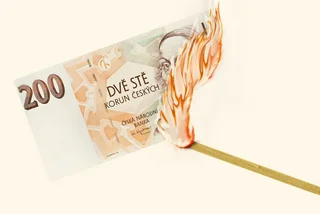Retail sales in Czechia have fallen year on year for the 12th month in a row, new data from the Czech Statistical Office (ČSÚ) reveals.
According to ČSÚ figures, the pace of retail sales’ slowdown eased slightly: from 9.5 percent in March to 7.7 percent in April. On a month-on-month basis, they decreased by 0.3 percent in real terms. Food sales dropped by a sizable 9.3 percent year on year, with sales of non-food goods declining 9.5 percent on average.
PARTNER ARTICLE
Sales in specialized stores with household products declined the most – by 16.5 percent year on year. Clothing and footwear sales dropped by 7.4 percent, computer and communication by 5 percent, and cosmetics and toiletries by 3.8 percent.
Some increases, amid lower prices
On the other hand, year-on-year sales of motor vehicles rose by over 6 percent due to increased car production, which has risen by about 30 percent year on year. Still-high, albeit declining, construction costs are partly behind this trend. Fuel sales also increased by about 7 percent year on year (and 3 percent month on month) due to falling fuel prices, which declined 16.7 percent on an annual basis.
The broad decline in retail sales – notwithstanding motor vehicles and fuel – is reflective of two aspects: high inflation and people’s reduced disposable income. Inflation remains at nearly 13 percent – separate figures from the ČSÚ show that meat prices grew by 12.7 percent year on year in April and sugar by 60 percent, for example.
The prices of goods and services in April 2023 also increased year on year by 14.5 percent and 10.1 percent respectively. Furnishings, household equipment, and routine household maintenance also increased on an annual basis, albeit at a lower rate.
Real wages in Czechia have in the past year declined by about 7 percent, and the purchasing power of Czech wages is at the lowest point in the past six years, Kurzy.cz writes. A survey released by discount website AkcniCeny.cz in May this year shows that almost 6 in 10 Czechs reported significantly reducing their food purchases due to inflation.
Peníze.cz also notes that about two-thirds of working people in all of Czechia earn less than the average wage, which is about CZK 41,000 gross). The ČSÚ’s news demonstrates that – although inflation is on a gradual downward trend in Czechia – consumers are still feeling the strain of higher prices.












 Reading time: 2 minutes
Reading time: 2 minutes 



























